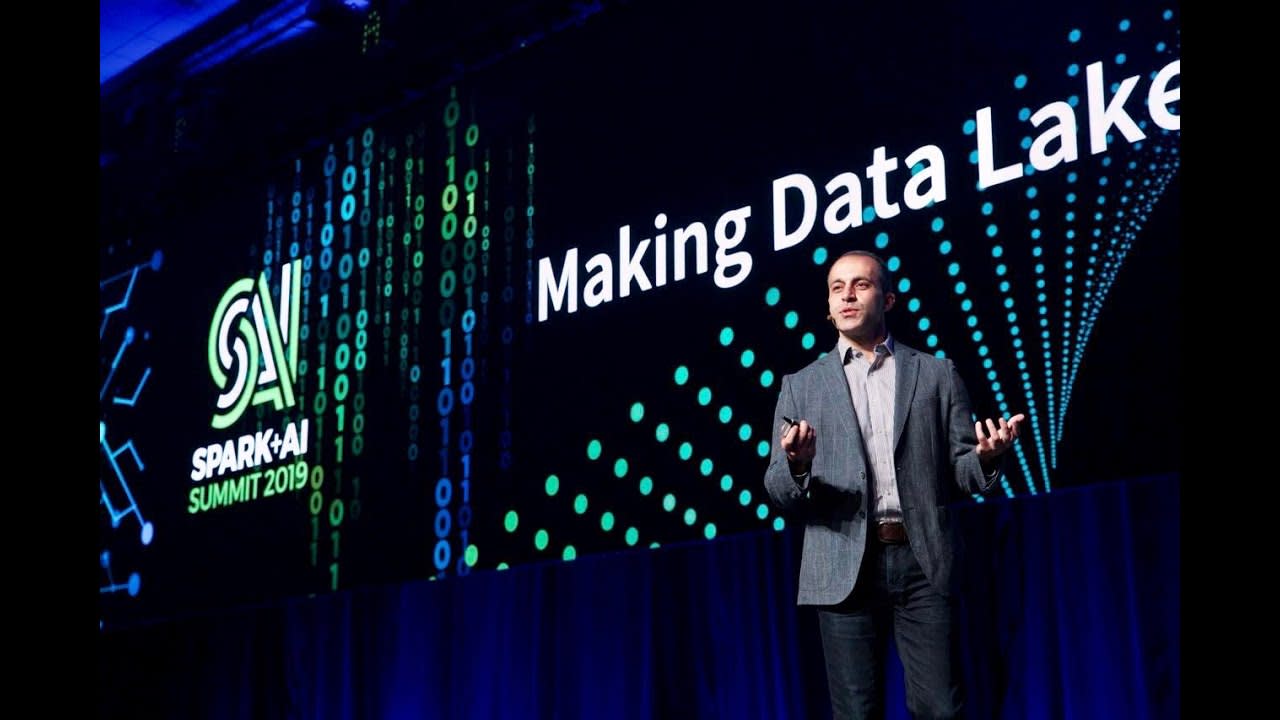Ali Ghodsi, co-founder and CEO of Databricks, speaks at the company’s Spark and AI Summit in San Francisco in April 2019.
Databricks
UiPath and Databricks became two of the most valuable privately held tech companies in the U.S. on Monday, with massive new funding rounds that give them a combined valuation of more than $60 billion. The cash haul gives them the option to take a non-traditional — but increasingly popular — route to the public markets.
UiPath, which makes software for automating office work, raised $750 million at a $35 billion valuation on Monday. Databricks, whose software helps companies process large amounts of data in the cloud, reeled in $1 billion at a $28 billion valuation.
They’re among the most hotly anticipated tech public offerings of 2021, and have now padded their balance sheets in a way that allows them to avoid an IPO in favor of a direct listing. UiPath expects to go public via that route, according to people familiar with the company, who asked not to be named because its plans are confidential. In December, UiPath submitted a draft registration with the SEC, disclosing its intent to go public.
A UiPath spokerson declined to comment for this story.
Databricks CEO Ali Ghodsi told CNBC after the funding announcement that his company is considering a direct listing but hasn’t made a decision.
“All options are on the table,” Ghodsi said. He added that a public listing is likely this year but for now he’s taking advantage of private capital because “I can get all the benefits without even going public.”
In a direct listing, a company lets existing shareholders and employees sell shares to new investors out of the gate, instead of raising capital by issuing new stock to a select group of firms. Spotify was the first notable tech company to take that approach in 2018, followed by Slack in 2019 and Palantir and Asana last year. Coinbase said last week that it will also go public through a direct listing.
Gaming company Roblox is expected to hit the market with a direct listing this month. In January, the company raised $520 million in a pre-public financing round to shore up its cash position.
For UiPath and Databricks, the decision is particularly significant because they’ll be going public in the shadow of Snowflake, which held the biggest software IPO in history last year, raising $3.9 billion. Snowflake priced its shares at $120 a piece, and they instantly popped to $245. That means new investors were effectively handed two shares for the price of one at the expense of the company.
Critics like venture capitalist Bill Gurley have been vocal in their calls for change, describing the traditional IPO as an “archaic process that has resulted in massive one-day wealth transfers straight from founders, employees and investors to the buy side.”
UiPath and Databricks have another option available to them that wasn’t there at the time of Snowflake’s offering. In December, the SEC approved a rule from the New York Stock Exchange that lets companies raise primary capital at the same time as a direct listing.
Ghodsi said Databricks is exploring that avenue as well. When asked if the company, fresh off its $1 billion raise, has enough money to go public without additional funds, he said, “absolutely.”
He was quick to point out, however, that there is value in the traditional IPO because it allows a company to choose its new shareholders, an argument that Snowflake CEO Frank Slootman made last year. Part of the tradeoff is that you offer a discount to top investors in exchange for a commitment of their support.
With a direct listing, nobody gets a discount and it’s open season for all investors.
“Maybe it’s worth diluting a few percent to build that relationship and trust,” Ghodsi said. “Because they’ll invest in you for the next decade.”
Revenue at Databricks jumped 70% last year, topping $425 million in annualized sales, Ghodsi said, noting that companies in health care, pharmaceuticals and financial technology have been among the top buyers of the software, which helps clients store, clean and visualize vast amounts of data from disparate sources.
UiPath said in mid-2020 that annualized revenue reached $400 million, from $100 million two years earlier. The company’s technology, which it calls robotic process automation, allows businesses to configure software to eliminate human tasks, enhancing speed and productivity.
Both companies are getting marked up partly in response to the success of Snowflake, which is now valued at $80 billion. According to Refinitiv, analysts on average expect Snowflake’s revenue to reach $1.1 billion in fiscal 2022, up from $580.1 million in the fiscal year that just ended last week.
Nominations are open for the 2021 CNBC Disruptor 50, a list of private start-ups using breakthrough technology to become the next generation of great public companies. Submit by Friday, Feb. 12, at 3 pm EST.

